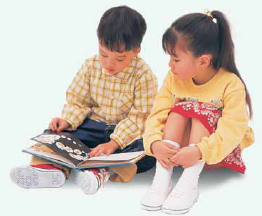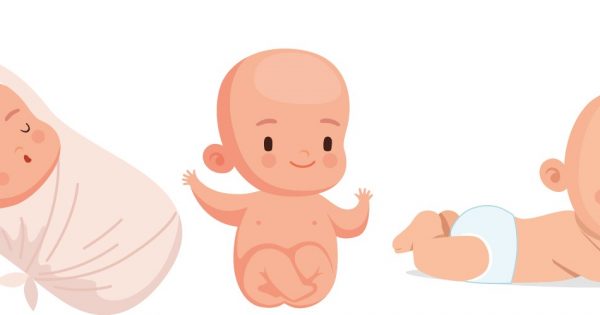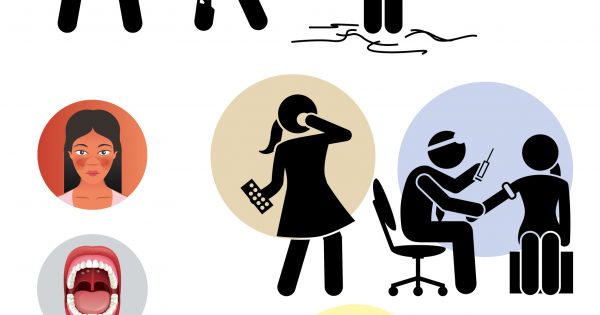Are you surprised at how much your toddler seems to understand? Or how fast your child is progressing in pre-school?
Don’t be. Young children’s brains are meant to act like sponges to help them quickly learn really important things. Your job as a parent is to stimulate your child’s mind and provide every opportunity for her to keep developing in preparation for primary school and beyond.
The most intensive and sensitive period of your child’s cognitive (mental) development is from early infancy to 10 years of age. She has two major goals: first, to understand symbols (like colours, pictures, letters in the alphabet and numbers) and second, to understand relative quantity (that one thing is more or less than another). Successfully attaining these goals is the foundation for acquiring more sophisticated skills like speaking, reading, maths, art and music.
Your child will learn by watching others, listening, playing and experimenting. When very young, even putting toys in her mouth or throwing them about will teach her a thing or two. But the older she grows, the more you need to participate in her learning process.
Good language skills are vital for communicating with others. However, they are also part of general learning and are believed to help prevent behavioural problems later on.
The period for developing language skills is between nine months and 7 years. After that, it becomes more difficult. So, be sure to constantly talk to your child and make an effort to tell her children’s stories, rhymes and poems. These activities will help her develop an appreciation for spoken language. Having older children re-tell the stories, rhymes and poems enable them to practise listening and memory skills.
Using appropriate reading aids (like books), such language activities will help your child understand that written words represent language. Simple reading skills you can teach her include recognising letters of the alphabet and their sounds, her written name and a limited number of written words.
Math activities help your child understand that numbers represent sets of objects. Teach your child to count while exploring the concepts of less, more and the same.
Drawing is one of the most enjoyable ways to visually depict objects and ideas. From merely scrawling initially, your child will begin to explore colours, shapes and textures. In time, she will come to appreciate art by using various materials to create different forms.
Like art, music promotes a child’s well-rounded development. Introduce your child to music by singing to her and playing or moving to rhythms. These are simple activities, yet they are the beginnings for appreciating music.
LEARNING BY STAGES
Children are all different in what they can do and what interests them. However, they tend to develop by stages. Here are some ideas on how to maximise your child’s learning at each one.
By her second birthday, you will find your toddler becoming something of a ‘super helper’. She will want to get involved in the chores you do, thinking everything’s a game. Enjoy it and praise lavishly when she picks up toys or puts things in their places for you.
Constructive learning opportunities include sorting clothes by colour while saying the colour word many times. Also, show your toddler different uses for the same things, eg using a spoon for digging and eating.
At around age 3, she’ll transform into a ‘butterfly’, flitting about to make friends with adults and children, alike. Mostly using three to four word sentences, she has something to say about many things.
This is the time when true conversations begin with your little one. Use those moments to also act out and recite rhymes, sing counting songs and read favourite stories (letting your child fill in frequent words). Go on walks and look at bugs, sticks or interesting rocks. Talk about everything you see and explain how things change over time.
By her fourth birthday, the ‘questioner’ in your child will awaken. Prepare for the barrage of questions: “Will it grow? Where does it go? How come? Can I see? Where can we go? How does it work? Why? Why? Why?” She now speaks in longer sentences, uses “I” correctly, knows her full name and those of everyone in your family, and lots more.
So competent, she loves feeling in control. So, let her make choices (like what book to read or TV programme to watch), join her in any kind of arts and crafts, and say silly things, only to let her catch your mistakes. Also, talk about feelings a lot – hers and yours.
When your child enters pre-school, she will be ready for the challenges of complicated toys, books and adventures. In time, she can confidently identify basic colours and basic shapes; count from memory; express complicated ideas; make up wonderful stories (sometimes confusing make-believe with the truth); and speak clearly, except for some hard-topronounce sounds.
You will be amazed at how much your child has learned and accomplished in so little time. Your little ‘expert’ will certainly remind you of her accomplishments. However, she still needs you to help her along with activities like having her act out made-up stories with mom and dad as audience and providing times to spend with other children the same age. Since your child is just starting to reason things out, be patient and accept the notions she insists are right, however strange they may be.
By the time your child enters primary school, she is an independent person. Keep talking with her and she will keep sharing her experiences with you – what she learns, how she’s doing in school, the friends she’s made, her ideas about things and her feelings.
Once you made yourself a part of her growing up; now she makes you part of her life. This is one of the greatest privileges and rewards of positive parenting.







Comments